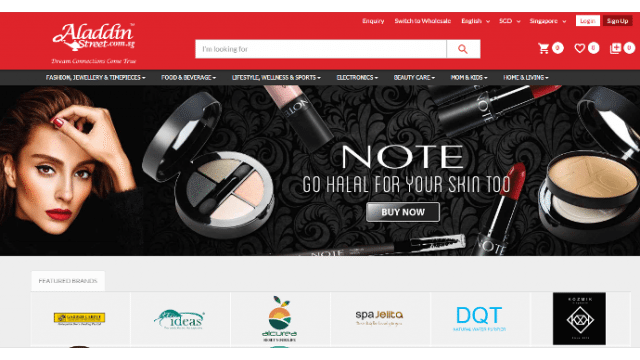Co-founder Dato Dr Grace Kong also has plans to launch the platform worldwide by 2017

According to the Pew Research Center, the fastest growing religion in the world is Islam, with the global Muslim population expected to jump from 1.6 billion to 2.76 billion by 2050. To the business sector, that growth translates to a lucrative market opportunity.
For many Muslims, secular businesses may not offer goods that fit into the religion’s guidelines. For example, some fashion chains lack modest outfits, and Islamic wear such as hijabs are usually only exclusively available in Muslim fashion stores, which are few and sometimes concentrated in an enclave — therefore, not easily accessible.
Recently, in Muslim majority countries such as Malaysia and Indonesia, astute entrepreneurs are riding the e-commerce wave to bring halal businesses into the internet age. These include Muslim e-commerce fashion startup HijUp (which raised a seven-digit funding sum last year) and halal products marketplace eHalal.com.
Now, an ex-Senior Financial Services director, Dato Dr Grace Kong, and the former and first Malaysian astronaut, Dato Dr Sheikh Muszaphar Shukor Al Masrie bin Sheikh Mustapha, want to establish Singapore as a hub for all things halal — food, cosmetics, fashion, etcetera — through the launch of their halal e-commerce marketplace AladdinStreet.
Is Singapore an ideal market for halal products?
Although Singapore has a sizeable Muslim population, they are far from the majority. A census conducted in 2010 pegged the domestic Muslim populace at about 15 percent, therefore, the market opportunity may be too small for sustainable and scalable profit growth.
But Kong does not believe this represents an obstacle. On the contrary, Singapore has the potential to be a hub for halal products in the region.
“Singapore has a reputation as the friendliest non-Islamic destination for Muslim travellers according to the Global Muslim Travel Index,” says Kong, in an email interview with e27.
“Countries like China and Japan look to Singapore as a benchmark for a successful halal industry without disrupting social and economic culture,” she adds.
Kong also says that the halal lifestyle extends beyond Muslims.
“‘Halal’ is a way of life, a new lifestyle trend … It is about making healthier and socially responsible and ethical choices that extend beyond food. The Singapore cosmopolitan market, although small, is significant in its contribution to the Aladdin group in terms of regional trade and business. Singapore is a melting pot of diverse race, culture and faith – an excellent halal marketing test bed for the group’s halal initiatives.”
What gives AladdinStreet an edge?
Kong has grand ambitions for AladdinStreet and believes it has an edge over other markets’ offerings.
First, AladdinStreet aims to be a platform for only premium quality halal products. All merchants come on board through invites only.
“Aladdinstreet is very selective with merchant and products acquisition. Food security today is the concern of the global community and shall remain so for the future. These concerns are more serious in developing countries where enforcement are weak and underdeveloped. Through AladdinStreet, halal standards can be more streamlined and harmonised, making it easy for consumers and businesses worldwide,” she says.
Secondly, it wants to extend its reach into markets worldwide.
“Existing ePlatforms/ eDirectories that list halal certified products are either focused on their own domestic market or focused solely on the Muslim markets … but AladdinStreet is an online market eco-system where merchants can access global cross-border trade at the same time able to tap into the numerous resources and support available to grow their business.”
Also Read: E-shopping platform for Muslim women Good Hijab aims to help underprivileged youth in Malaysia
Launched in 2015, AladdinStreet is currently only available in Malaysia, Singapore and China. But Kong plans to expand its market presence to other countries and regions such as Central Asia, Indonesia, Australia, New Zealand, Thailand, and India, by the first quarter of 2017. About 30 overseas offices will be set up with the goal of reaching 50 countries, eventually.
“We are cognisant of the fact that such huge scaling up of coverage within such a short period will be a huge challenge; hence we are not going it alone. We will work with local partners and accordingly, leverage on their ‘home ground’ knowledge and expertise,” says Kong.
Currently, AladdinStreet Singapore has already identified 200 merchants and secured close to 60 merchants, of which close to half are halal-certified. These include providers of F&B services, vitamins, cosmetics, pharmaceuticals, fashion and other services.
One of these merchants is Food Empire, a halal-certified instant beverage and frozen food company. It exports its products to regions such as Central Asia and the Middle East.
AladdinStreet has allocated a massive advertising and marketing budget of US$130 million over three years to evangelise its service and expects to reap a whopping US$17.5 billion in Gross Merchandise Value (GMV) by the end of these three years.
On how AladdinStreet managed to accrue such an enormous investment for a new startup, Kong only discloses that the funding comes from internal sources.
For AladdinStreet Singapore, Kong forecasts a total revenue of US$50 million for the next 18 months; and for Malaysia, a revenue of RM 200 million (US$47.6 million) for the same period. It expects to hit profitability within a year.
It will also be seeking additional funding in the future.
“We seek to raise funds to further pursue our marketing activities to expedite our merchants and customers acquisition strategies with the objectives to enlarge our market clout, acquire and recruit talents, drive greater site traffic, conversion rates, visitor’s traction, invest in new innovations and technologies to provide better overall customer experience and satisfaction,” she says.
In a region that is dealing with a tumultuous e-commerce market — layoffs, sell-offs and shut-downs abound — pundits would be observing AladdinStreet cautiously, and whether halal products would, as Kong hopes, garner a broader appeal beyond Muslims.
—-
Image Credit: AladdinStreet
The post An ex-Prudential director wants to make Singapore a halal e-commerce hub appeared first on e27.